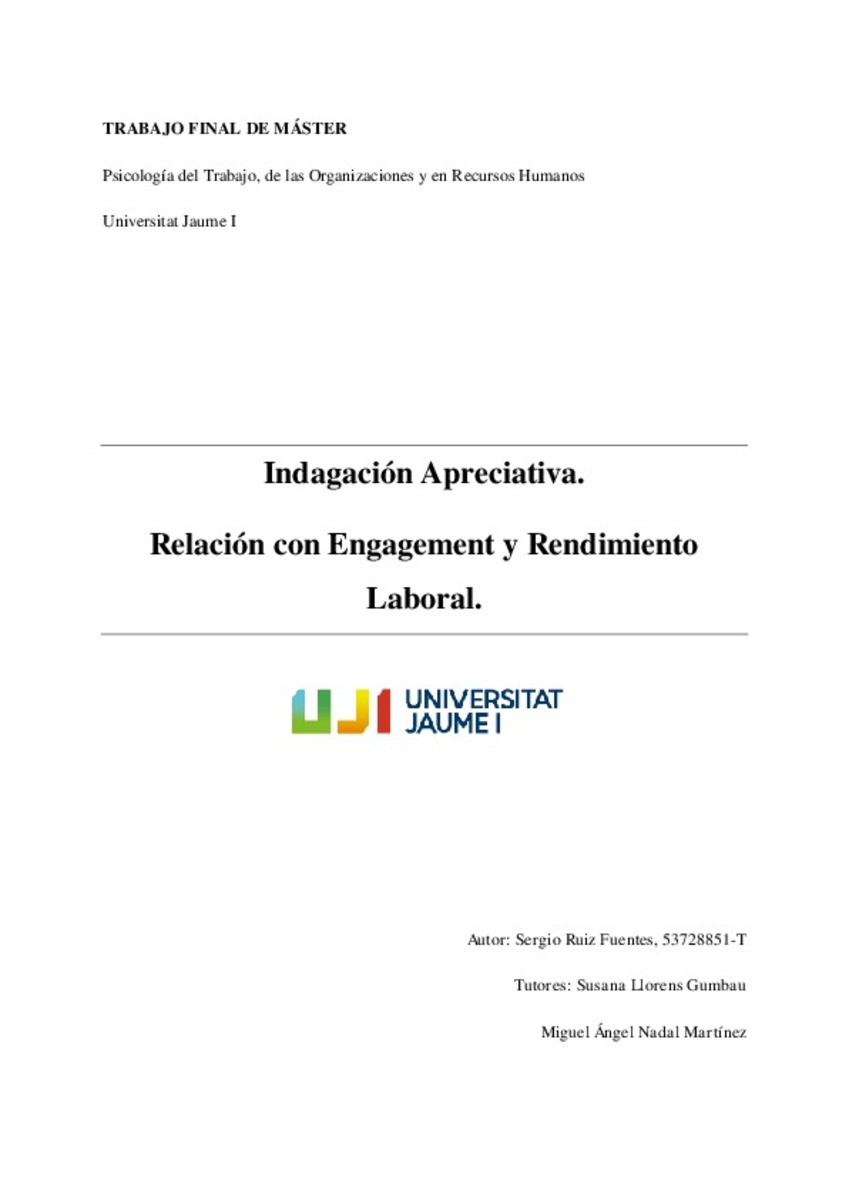Mostra el registre parcial de l'element
Indagación Apreciativa. Relación con Engagement y Rendimiento Laboral.
| dc.contributor.author | Ruiz Fuentes, Sergio | |
| dc.contributor.other | Llorens Gumbau, Susana | |
| dc.contributor.other | Nadal Martínez, Miguel Ángel | |
| dc.contributor.other | Universitat Jaume I. Departament de Psicologia Evolutiva, Educativa, Social i Metodologia | |
| dc.date.accessioned | 2019-01-31T10:27:22Z | |
| dc.date.available | 2019-01-31T10:27:22Z | |
| dc.date.issued | 2018-07-18 | |
| dc.identifier.uri | http://hdl.handle.net/10234/180487 | |
| dc.description | Treball Final de Màster Universitari en Psicologia del Treball, de les Organitzacions i en Recursos Humans. Codi: SBE013. Curs acadèmic: 2017/2018. | ca_CA |
| dc.description.abstract | The research shows how Appreciative Inquiry generates changes both individually and in groups and in all contexts (Cooperrider, Whitney & Stavros, 2008) through a process which drives change by increasing strengths and converting them into habits that promote growth, hope and motivation. This methodology aims to discover the best in everyone and also strengthens the relationship between the worker and his organization (Subirana & Cooperrider, 2013). It has been shown that Positive Inquiry has a certain association with Engagement by promoting positive change and improving satisfaction, but this association is still little explored. Therefore, in this paper we try to see if this process improves the levels of Engagement in a group composed of 15 workers when performing an intervention based on Appreciative Coaching. To this end, experimental subjects were selected with average levels of Engagement measured by the Utrecht Work Engagement Scale (UWES-9) (Schaufeli, Bakker and Salanova, 2006). The individuals participated in a structured Appreciative Coaching process in 18 sessions during 6 months, and later they were passed again the UWES-9 to check if the intervention had increased the levels of Engagement with which they started. | ca_CA |
| dc.description.abstract | La investigación demuestra cómo la Indagación Apreciativa genera cambios tanto a nivel individual como grupal y en todos los contextos (Cooperrider, Whitney & Stavros, 2008) mediante un proceso que impulsa el cambio al incrementar las fortalezas y convertirlas en hábitos que promueven el crecimiento, ilusión y motivación. Esta metodología pretende descubrir lo mejor que existe en cada uno y consigue además fortalecer la relación entre el trabajador y su organización (Subirana & Cooperrider, 2013). Se ha demostrado que la Indagación Positiva guarda cierta relación con el Engagement al promover un cambio positivo y mejorar la satisfacción, pero esta relación todavía se encuentra poco explorada. Por ello, en el presente trabajo se pretende comprobar si mejoran los niveles de Engagement en un grupo compuesto por 15 trabajadores al realizar una intervención basada en Coaching Apreciativo. Con este fin, se seleccionaron los sujetos experimentales con niveles medios de Engagement medido con el Utrecht Work Engagement Scale (UWES-9) (Schaufeli, Bakker y Salanova, 2006). Los individuos participaron en un proceso de Coaching Apreciativo estructurado en 18 sesiones durante 6 meses, y posteriormente se les volvió a pasar el UWES- 9 para comprobar si la intervención había aumentado los niveles de Engagement con los que partían. | ca_CA |
| dc.format.extent | 32 p. | ca_CA |
| dc.format.mimetype | application/pdf | ca_CA |
| dc.language.iso | spa | ca_CA |
| dc.publisher | Universitat Jaume I | ca_CA |
| dc.rights | Attribution-NonCommercial-NoDerivatives 4.0 Internacional | * |
| dc.rights.uri | http://creativecommons.org/licenses/by-nc-nd/4.0/ | * |
| dc.subject | Màster Universitari en en Psicologia del Treball, de les Organitzacions i en Recursos Humans | ca_CA |
| dc.subject | Máster Universitario en en Psicologia del Trabajo, de las Organizaciones y en Recursos Humanos | ca_CA |
| dc.subject | Master's Degree in Work and Organisational Psychology and Human Resources | ca_CA |
| dc.subject | Engagement | ca_CA |
| dc.subject | Inquiry | ca_CA |
| dc.subject | Appreciative | ca_CA |
| dc.subject | Coaching | ca_CA |
| dc.subject | Indagación | ca_CA |
| dc.subject | Apreciativa | ca_CA |
| dc.title | Indagación Apreciativa. Relación con Engagement y Rendimiento Laboral. | ca_CA |
| dc.type | info:eu-repo/semantics/masterThesis | ca_CA |
| dc.educationLevel | Estudios de Postgrado | ca_CA |
| dc.rights.accessRights | info:eu-repo/semantics/openAccess | ca_CA |
Fitxers en aquest element
Aquest element apareix en la col·lecció o col·leccions següent(s)
-
TFM: Màster Universitari en Psicologia del Treball, de les Organitzacions i en Recursos Humans [320]
SAK034; SBE513; SBE013








